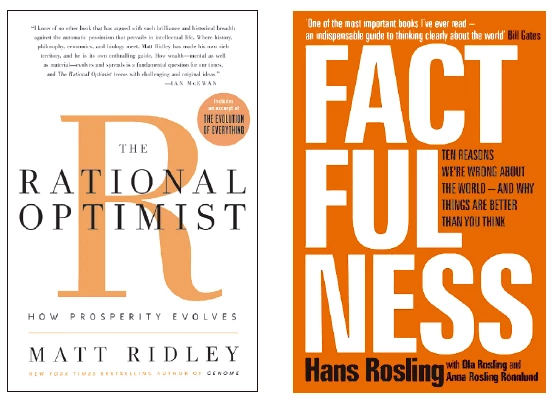
The title of the poem by Rubén Darío, ‘The Optimist’s Greeting,’ is a good way to introduce two recent works by prominent ‘new optimists’: Enlightenment Now, the latest book of the media-savvy Harvard professor Steven Pinker, explains the thesis that the world is doing well through 72 graphs, and attributes the improvement in all social, economic, and political indicators to the spread of the values of reason, science, and humanism that crystallized with the Enlightenment; and Progress, the influential work of the Swedish economic historian Johan Norberg, enumerates the reasons why we can look forward to the future with optimism. Along the line of the science writer Matt Ridley, who in 2010 published The Rational Optimist, both Pinker and Norberg persuasively document the significant advances made by humanity in the recent past and project their rational optimism towards the near future.
Though much differing in size and detail – Enlightenment Now is 450 pages of dense text plus 100 of notes in tiny type, and Progress is an essay that takes an afternoon to read – they present similar points and even refer to one another: Pinker mentions Norberg’s book at various points, while the latter’s chapter on violence is to a large extent based on The Better Angels of Our Nature, Pinker’s 2011 bestseller which Bill Gates famously called “the most inspiring book I’ve ever read,” also cited in the Norberg chapter on equality, presenting the historical advances in this direction with the effective eloquence that made The Economist name Progress Book of the Year in 2016.

Matt Ridley called for a rational optimism, as would Steven Pinker or Johan Norberg later in their shared defense of progress; they would be joined by the late Hans Rosling using data on health and life expectancy.
Beyond mutual mentions, the intellectual kinship between the two authors is manifested in their shared reference to the ‘veil of ignorance’ that John Rawls proposed in his 1971 classic, A Theory of Justice – surprisingly wrongly dated by both authors, as Norberg quotes 1973 as release year, whereas Pinker mentions 1976 – to denounce the hypocrisy of the progressive enemies of progress, who are invited to reincarnate at random in a member of a past society; and in their shared concern about the distorsions caused by media catastrophism, which gives pessimism a prestige unendorsed by facts. Both mention Max Roser’s statement (in OurWorldinData.org) that if newspapers were to record reality, their headlines should read: “The number of people in extreme poverty fell by 137,000 since yesterday,” and this every day during the last 25 years.
Pinker and Norberg insist that the world is ‘better than ever,’ and in areas as diverse as food, health, wealth, equality, the enviroment, security, freedom, quality of life, and happiness, thanks to progress made in the West since 1800 and everywhere else since World War II. Pinker even points out that, besides growing taller, we have become more intelligent in a century, thanks to advances in nutrition, health, and the environment, given that the brain is a great consumer of energy and has a demanding metabolism.
Many will dismiss such rosy perspectives as Panglossian and place such narratives in the framework of Stuart Carroll’s ‘comfort history’; others, like the philosopher John Gray, will draw attention to the limitations of a quantitative approach, and warn about the unpredictability that ‘black swans’ bring to their predictions; some will defend the critical virtues of pessimism, which makes it possible to detect problems and thus propose remedies; and a few will lament the enlightened censure of magic thought, religious faith, or Nietzschean irrationalism, which nevertheless has produced what Mark Lilla calls the ‘tyrannophilia’ of so many intellectuals. In the final analysis, reality is stubborn, and data offer a narrative that would be worth upholding before the swans (white ones, naturally), and with the optimistic hexameters of the Nicaraguan poet who in 1905 wrote in Madrid his songs of life and hope in opposition to the somber pessimism of the Spanish Generation of 1898.








